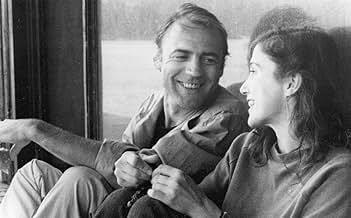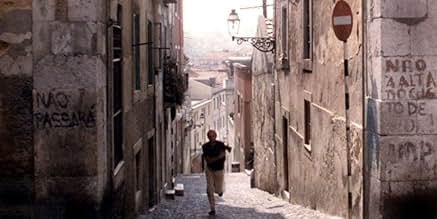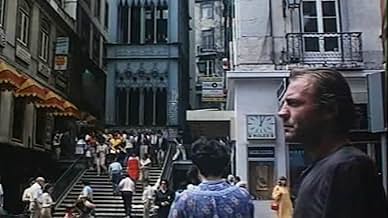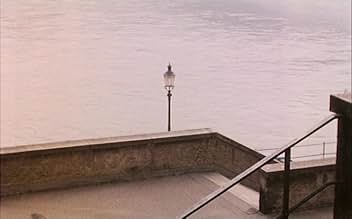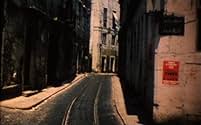Dans la ville blanche
- 1983
- 1 घं 48 मि
IMDb रेटिंग
7.3/10
1.5 हज़ार
आपकी रेटिंग
अपनी भाषा में प्लॉट जोड़ेंA Swiss sailor abandons his post during a stopover in Lisbon and takes up residence in a small hotel in the city.A Swiss sailor abandons his post during a stopover in Lisbon and takes up residence in a small hotel in the city.A Swiss sailor abandons his post during a stopover in Lisbon and takes up residence in a small hotel in the city.
- पुरस्कार
- 2 जीत और कुल 1 नामांकन
Paulo Branco
- L'homme dans la gare
- (बिना क्रेडिट के)
फ़ीचर्ड समीक्षाएं
Ever been a tourist and thought of just staying where you are? This moody and reflective movie by Swiss director Alain Tanner captures this feeling for us all enticingly. The film has not had the showings it conspicuously deserves. It draws us in to contemplate what might happen if we simply stopped doing what we've always just done? And the haunting sense of authenticity is heightened using cuts of super-8 movie clips (as representations of a filmic mimicry of the pulse, taste and feel of life as it is lived on the edge).
Bruno Ganz (long before his Hitler portrayal) simply gets of the boat on which he was an engineer and loses himself and us in the sounds and sights of a foreign land. Lisbon evocatively unfurls before us in realistically plausible super-8 snatches as Ganz's character becomes enveloped in the flavour and mystery of a poor quarter of the city. Hopelessly drunk and plaintively playing his harmonica through the minutes and hours spent in his hotel room commanded by its dripping tap, the character posts film home to his wife in clinical Switzerland. Time and place are punctuated by escapes into drink, romance whilst the character clutches at every moment's freshness and tracing the lines of a web of ordinariness which is so easy to experience voyeuristically.The clock in the hotel symbolically goes backwards. Maybe there are times when perhaps we need to go back in order to move forward.
Bruno Ganz (long before his Hitler portrayal) simply gets of the boat on which he was an engineer and loses himself and us in the sounds and sights of a foreign land. Lisbon evocatively unfurls before us in realistically plausible super-8 snatches as Ganz's character becomes enveloped in the flavour and mystery of a poor quarter of the city. Hopelessly drunk and plaintively playing his harmonica through the minutes and hours spent in his hotel room commanded by its dripping tap, the character posts film home to his wife in clinical Switzerland. Time and place are punctuated by escapes into drink, romance whilst the character clutches at every moment's freshness and tracing the lines of a web of ordinariness which is so easy to experience voyeuristically.The clock in the hotel symbolically goes backwards. Maybe there are times when perhaps we need to go back in order to move forward.
In his long career as one of Swiss cinema's biggest as well as famous directors, Alain Tanner has made many "self discovery" genre of films. These are films in which actors are mere tools to propagate directors' ideas about art, creativity and life as they also turn out to be their alter egos. The opinion about these films is divided. Some viewers consider them to be absolutely pretentious. There are also viewers who judge these films to be intelligent. As a film critic, I chose to watch this film as it is a film admired by my friend Jean-Jacques Beineix. In the white city is an intelligent film about loneliness, loss of companionship with surprising erotic elements. It would appeal to viewers as it raises many questions about which no definitive answers can be found. One is free to choose as many personal interpretations as possible. These questions are related to a person's desire to escape from everything which is an essential part of life. Dans La Ville Blanche / In the white city connects easily with viewers especially those intrepid souls who would like to escape from all forms of civilization. Apart from actor Bruno Ganz in one of the best roles of his career, city of Lisbon emerges as a major star attraction. It is worth exploring for the turbulent nature of its old city, markets, and pool halls.
10szubcic
This movie mesmerized me. It is loose jointed, like any traveler's experiences, and gives the viewer the feeling of living through a sailor's wayward days in Lisbon. Even though it hasn't much of a plot, it's curiously compelling. What drove the story for me was trying to figure out what was happening in the sailor's mind. One gets the feeling that he is going through a crisis, that this is a turning point in his life--ought he to keep on travelling, being a perpetual stranger, or should he go back to Germany & his lover/wife? The feeling accompanying this conflict verges between despair and sublimity--it evoked in me the same empty ache I felt the sailor was going through. Deceptively simple, but artful & subtle. A fine picture for all of us wanderers.
10zetes
A stunning and original film. This is the second film by Alain Tanner I've seen. I watched his Jonah Will Be 25 in the Year 2000 last summer, and it sticks with me as few films have. In the White City might not, but who knows. It's already getting bigger in my mind, and I only turned the VCR off about five minutes ago. This film concerns a drifter of sorts (Bruno Ganz, in a role very different from others of his that I've seen) who finds his job as a sailor too tedious and unfulfilling. When his ship docks in Lisbon, he quits without a word and moves into a small hotel. There he meets a cute bartender who works downstairs (Teresa Madruga); she's a strong personality, which attracts him. The mystery surrounding the sailor pulls her in, and they become lovers. Meanwhile, Ganz wanders around Lisbon with a small, handheld camera shooting random things. He also writes brief letters and throws them, along with reels of film that he has shot, into the mail. We then see another woman, this one in Switzerland, who is apparently Ganz's abandoned wife. We find out very little about her (she never has a name). All we know is that she's upset about her man's absence, and he seems to be cruelly hurting her. Is he doing this on purpose? What exactly is the deal with this guy? I was just as curious about this guy as Madruga was. But the more she finds out about him, the less impressed she is. Perhaps he's not some romantic adventurer. Perhaps he's just a loser. I just found this person so fascinating. Many will find the film a bore, I think, but it was amazing to me. Even if you don't care for it, you must admit that the jazzy musical score by Jean-Luc Barbier is exceptional (one of the best, I think) and that Acácio de Almeida's cinematography is breathtaking. To me, it's all around a masterpiece. 10/10.
To drop out of society: this is one of the central topics in the films of Alain Tanner. Unfortunately, we cannot just vanish: we leave traces. We also leave commitments, partners, children, our post, the apartment. And if we get really able to reach the state of completely breaking off all outer belongings without touching our inner states, we are still far away from being free: We are neither free to do something, because in well-organized societies, my freedom-to stops exactly there where the freedom-to of my neighbor starts, and since we are crowded on this planet, there is not much to accomplish. And neither is our freedom-from so easily to achieve, because we live in a global society where only the suicide is for free.
In Tanners's "Messidor" we have Marie and Jeanne, whose freedom-to ends quickly, namely in the moment where there are out of money. In "Charles vif ou mort", Charles' freedom-from ends there, where he sees that it is not to accomplish without destroying the whole society, which is rather impossible. And in the never-land between freedom-to and freedom-from, there is Paul in "Dans la Ville Blanche", the Swiss sailor, who decides one day not go back to his ship but to stay in Lisbon until his money is gone. In a letter to his partner in Zurich, he writes: "I am not in vacation, since a vacation must be planned, and planning is work. I am doing NOTHING". All central characters of Tanner's movie want the same: to experiment how it is possible to experience the ABSENCE of something: the empty space as absence from the crowd, the empty time as the absence of obligations in society. And all of them fail sooner or later: either they cannot go on anymore, because the emptiness has turned into nonsense, or people do not let them go, because they want them put behind bars - of prisons or clinics.
In Tanners's "Messidor" we have Marie and Jeanne, whose freedom-to ends quickly, namely in the moment where there are out of money. In "Charles vif ou mort", Charles' freedom-from ends there, where he sees that it is not to accomplish without destroying the whole society, which is rather impossible. And in the never-land between freedom-to and freedom-from, there is Paul in "Dans la Ville Blanche", the Swiss sailor, who decides one day not go back to his ship but to stay in Lisbon until his money is gone. In a letter to his partner in Zurich, he writes: "I am not in vacation, since a vacation must be planned, and planning is work. I am doing NOTHING". All central characters of Tanner's movie want the same: to experiment how it is possible to experience the ABSENCE of something: the empty space as absence from the crowd, the empty time as the absence of obligations in society. And all of them fail sooner or later: either they cannot go on anymore, because the emptiness has turned into nonsense, or people do not let them go, because they want them put behind bars - of prisons or clinics.
क्या आपको पता है
- ट्रिवियाThe film was selected as the Swiss entry for the Best Foreign Language Film at the 56th Academy Awards.
टॉप पसंद
रेटिंग देने के लिए साइन-इन करें और वैयक्तिकृत सुझावों के लिए वॉचलिस्ट करें
- How long is In the White City?Alexa द्वारा संचालित
विवरण
- रिलीज़ की तारीख़
- कंट्री ऑफ़ ओरिजिन
- आधिकारिक साइटें
- भाषाएं
- इस रूप में भी जाना जाता है
- In the White City
- फ़िल्माने की जगहें
- उत्पादन कंपनियां
- IMDbPro पर और कंपनी क्रेडिट देखें
बॉक्स ऑफ़िस
- दुनिया भर में सकल
- $2,540
- चलने की अवधि1 घंटा 48 मिनट
- ध्वनि मिश्रण
- पक्ष अनुपात
- 1.66 : 1
इस पेज में योगदान दें
किसी बदलाव का सुझाव दें या अनुपलब्ध कॉन्टेंट जोड़ें


